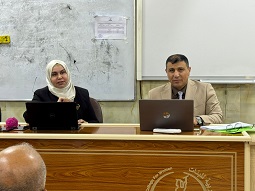
Academic article by Dr. Asma Khalaf Madlool
Let her Go
Dr. Asmaa Khalaf Madlool
How beautiful it is for our tastes to probe in untrodden spots that may be hidden to others. Supporting this human writing can gain a perfectness by gathering our differences. Today, I am captivated by a poet who in spite of being sarcastic and humorous, has untold pain and grief that spread between and behind the lines of her poems. Her pain`s age is as large as humanity. Her laughter and humorous style fail to hide its flow. It is the contemporary British poet Stevia Smith (1902-1971). Her talent attracts the attention of great poets like Seamus Heaney Who described her in his ''A Memorable Voice: Stevie Smith'' (Heaney 211). And Nash who wrote about her in his in his ''Who, and What is Stevia Smith''( Nash 1964).
I was drawn to her life before entering her kingdom of creativity. As a child, She tastes the pain of her mother`s death in her early childhood and the escape of her father in endless travel. Destiny usually does not close all doors, it can leave an open door or even a half opened one. Her aunt whom Stevia referred to as the 'noble' in her poetry, embraces Stevia and her sister for their last day in our world. I come out in difficulty from the kingdom of her life to step into the kingdom of her creativity in which she translates her delicate feelings into poetic words. Despite my reservations about some of her views, I find a crystal creativity and a literary daring that go beyond her talent as a poet to the invention of new vocabulary in her poetry. She deserves Calvin Bedient `s depiction of her as ''fearless'' (Bedient 167).
I want to share with you her poem "Let him Go", in which she reveals what she hided previously. Stevie begins her poem with a ruthless Roman emperor wandering among his cells of prison, not inspecting, but enjoying the suffering of his victims. The inhabitants of the dark, narrow dungeons beg their executioner to grant them death. The emperor's response is, ''Oh no, Oh no, we are not yet friends enough '' (Stevie 2015). This shows that death has become a reward and should be given to beloved ones. Our poetess, however, shocks her readers by asking her Muse the very request of death to receive the same response that she does not yet reach the level of true loved ones to be granted such a gift. As the poet reaches the end of her journey in this poem, she presents excuses to insist on getting this reward. If you have the very suspense as mine to know these excuses, old age that is full with pain, joy and painful illness are the crown of her excuses. Ultimately she is accepted as a friend to be granted death and hear the last decision of “let her go.”
Unintentionally, she fulfills this in her real life. Out of pain of unrecoverable disease from which she cannot speak only in gesture. she draws to her doctor and friends “a ring round the word ‘death'' that is found in a poem (Stevie 1990 14). She requests her friends, not the cruel emperor, to let her go. She departs the world leaving a long history of creativity and her words that remain here to immortalize her. Let us employ with slight additions what Stevie presented. Though we differ in our perspectives from some of what our poetess finds in death, but we may meet with her in other poems to state that we are not created for death, but to live and build. Our poet in her life diverts pain into sincerity and affection for the world that is organized accurately by the divine power. Though Death is inevitable, it will be so different depending on our previous achievements and what we grow to be reaped by others .
References
Bedient, Calvin. ''Horace and Modernism'' In Search of Stevie Smith. Edited by Sanford Sternlicht. New York: Syracuse University Press, 1991.
Heaney, Seamus. A Memorable Voice: Stevie Smith. In In Search of Stevie Smith. Edited by Sanford Sternlicht. New York: Syracuse University Press, 1991.
Nash, Ogden. Promotional Card for Stevie Smith. In Selected
Poems. New York: New Directions,1964. .
Smith, Stevie. The Collected Poems & Drawings of Stevie Smith.
Edited by Will May. London: Faber & Faber. 2015.
Smith, Stevie. Some are More Human than Others: A Sketchbook. London: Peter Owen,1990.




